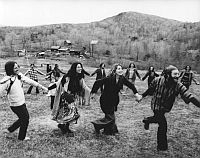 In
In
the 1960s and early seventies, thousands of disaffected young people migrated
to rural Vermont and neighboring areas to live together on communal farms. Most
of these communes are long gone, but their legacy remains. Our guest Tom Fels of
North Bennington has just published a book on the network of communal farms
that he was part of in northwestern
Massachusetts and southern Vermont. Also with us is poet and teacher Verandah
Porche, who still lives on the farm in Guilford where she settled with her
counterculture friends in 1968. Together we examine how the commune movement
shaped, and was shaped by, Vermont’s culture. (listen)


Also
on the program, abandoned and feral cats far exceed the numbers of abandoned
dogs, and pose a continuing problem for humane societies around the region.
Host Jane Lindholm visits an animal shelter to get a handle on the problem. (Listen)

And
comic Martha Tormey talks about her run-ins with some frightening Vermont
flora. (Listen)
LISTENER COMMENTS ON THE LEGACY OF VERMONT’S COMMUNES
Arthur from Brattleboro writes:
I have lived in Guilford
since ’66, and although I didn’t live communally, I was a near neighbor of the Guilford
communes and watched them develop and evolve from the sidelines.
On today’s Vermont Edition, it was said several times that
the "movement failed." One caller commented that it wasn’t really a
movement; people moved into the Vermont
countryside for many reasons. I take issue with the notion that the people who
lived in the communes (and the rest of us who moved into Vermont
at that time for similar reasons) failed.
The Vermont of today, full of art, music, and every sort of
creative endeavor is largely the creation of the young idealists who left the
lure of the big cities in the 60’s and 70’s to come "back to the
land." We weren’t all farmers or into communal living. Some of us moved
here, experimented with living on a human scale, and then moved back into the
mainstream. Others discovered a world we loved and wanted to live in,and we
found ways of making a living while contributing to society as a whole. Many of
us were philosophically inclined to the arts and education, but we have found many
varied ways to contribute.
The economic vigor of entrepreneurial Vermont today is based on the success, not the failure, of
the generation of young people who made Vermont home during this time. Of course, there were
wonderful, strong Vermonters (farmers, other business people, and artists) who
were here before us and set the stage. And ever since the era of the communes
there have been young people, both our children and those who have moved here,
young idealists who have continued and enhanced what we have been building.
Evan from Townshend
writes:
I believe we are in midst of another "back to the
land" movement. There are so many young folks working and learning on
(especially organic) farms in this region and across the entire country. Myself
included. Many of these young people did not necessarily grow up on farms, but
have embraced rural lifestyles and have been pursuing agricultural skills that
have largely disappeared from our culture.
One of the main differences nowadays however, is the much higher cost of decent
agricultural land. Its nearly impossible for young farmers to purchase farm
land whose value has been inflated because of development and absentee owners.
We need more young farmers to feed us, and help getting them into land!